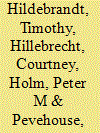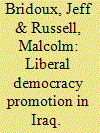|
|
|
Sort Order |
|
|
|
Items / Page
|
|
|
|
|
|
|
| Srl | Item |
| 1 |
ID:
124578


|
|
|
|
|
| Publication |
2013.
|
| Summary/Abstract |
The debate around humanitarian intervention and the responsibility to protect generally concerns a collective action problem on the international level: motivating states to participate in a multilateral coalition to stop a mass atrocity. This debate presupposes that states enjoy a domestic consensus about their rights and responsibilities to intervene. This article reconsiders this assumption and examines the sources of domestic political will for intervention, particularly the role of partisanship, ideology, and public opinion on Congressional members' willingness to support US intervention for humanitarian purposes. We analyze several Congressional votes relevant to four episodes of US humanitarian intervention: Somalia, Haiti, Bosnia, and Kosovo. We find that public support for humanitarian intervention increases Congressional support and that other political demands, primarily partisanship and ideological distance from the president, often trump the normative exigencies of intervention. Our findings shed light on the domestic political dynamics behind humanitarian intervention and can help explain why some recent humanitarian missions have proceeded without seeking Congressional approval.
|
|
|
|
|
|
|
|
|
|
|
|
|
|
|
|
| 2 |
ID:
124599


|
|
|
|
|
| Publication |
2013.
|
| Summary/Abstract |
is article asks whether there are lessons that can be drawn from the democratization of Iraq for the possible democratization of the Middle East and North Africa (MENA) in the wake of the 2010-2011 Arab uprisings. The paper draws on the democratization program in Iraq in 2003 and 2004 to demonstrate that focusing on the promotion of a liberal democratic model in Iraq translated into a lack of operational flexibility, which let democracy assistance unable to cope with socio-economic demands, local realities and reactions to democratization. Taking into account a variation in the intensity of interventionism between Iraq and MENA, the article argues that there is sufficient similarities between both cases to point Western democracy promoters in the direction of models of democracy that offer a more comprehensive response to the current political transition in Egypt, Tunisia and Libya than the traditional focus on the promotion of liberal democracy does.
|
|
|
|
|
|
|
|
|
|
|
|
|
|
|
|
| 3 |
ID:
124584


|
|
|
|
|
| Publication |
2013.
|
| Summary/Abstract |
In the last two decades, Muslim minorities have organized politically as Muslims (as opposed to ethnic or national identities) to influence foreign policy in the United States, Canada and the United Kingdom. This paper evaluates to what extent and in what ways Muslim identity impacts upon the determination of the foreign policy interests and lobbying of Muslim interest groups in these pluralist democracies, as compared to other variables at the national and organizational levels. Analysis is based largely on primary documents, such as press releases and newsletters, issued by five leading Muslim interest groups in the US, Canada and the UK, as well as interviews with the leaders of these organizations.
|
|
|
|
|
|
|
|
|
|
|
|
|
|
|
|
| 4 |
ID:
124597


|
|
|
|
|
| Publication |
2013.
|
| Summary/Abstract |
The adoption of international norms by a state depends on the active support of decision makers in key gatekeeping positions. Yet, political change does not inevitably follow the initiatives of norm entrepreneurs. The literature on norm dynamics has largely focused on successful norm change. This focus on cases that support the notion that norms matter constitutes selection on the dependent variable. To more fully grasp the role and limits of gatekeepers, it is important to also investigate cases where political resistance prevented the domestic adoption of international norms. This study uses an illustrative case study in which circumstances appeared ripe for a new policy direction but where change failed to materialize. The study concludes that gatekeepers matter, but also that norm change crucially, depends not only on gatekeepers' ability to frame norms in terms that resonate domestically but also on their ability to build coalitions with other relevant political actors.
|
|
|
|
|
|
|
|
|
|
|
|
|
|
|
|
| 5 |
ID:
124579


|
|
|
|
|
| Publication |
2013.
|
| Summary/Abstract |
While there is a long, rich tradition of scholarship on the impact of foreign policy on presidential campaigns and elections, the question of the role of foreign policy concerns in congressional elections has been left largely unexplored. This is particularly surprising given that scholars have in recent years highlighted the significant impact of Congress on American foreign policy both as an institution and as the result of the foreign policy activism of individual members. This earlier research indicates that the role of foreign policy in congressional campaigns and elections deserves much more attention than it has so far received. In this project, we examine the use of foreign policy in the 2000, 2002, and 2004 congressional campaigns, analyzing the issue content of television advertisements produced by candidates seeking election to the US House of Representatives. We find that across the three election cycles, foreign policy issues became much more prominent over time but still remained a modest part of candidates' appeals to potential voters. We also find differences between candidates rooted in partisan identification and perceptions of policy performance on key foreign policy issues, and strong indications that candidates emphasize foreign policy issues that have significant local impact.
|
|
|
|
|
|
|
|
|
|
|
|
|
|
|
|
|
|
|
|
|